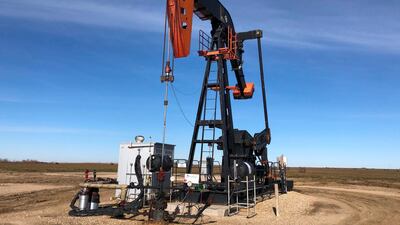Oil continued to slide on worries China’s deadly coronavirus will crimp crude demand in an oversupplied market, as Saudi Arabia said it is “closely monitoring” the situation and reassured the market that Opec and its allies are capable to address concerns.
Futures in London and New York plunged more than 3 per cent after China toughened travel restrictions as the death toll climbed to above 80 and nearly 3,000 people have been infected. The FTSE 100 slid 1.4 per cent, Germany's Dax fell 1.5 per cent and Japan's Topix shed 1.6 per cent. Investors turned to gold, a traditional save haven, which rose to $1,586 an ounce.
Though the World Health Organisation held off on declaring a global emergency, it said it is an emergency in the world's second largest economy. Markets in China were closed due to the Lunar New Year and an unprecedented quarantine effort by the government. Beijing extended the new year holiday, scheduled to end on January 30, to February 2 and big Chinese companies like Tencent ordered staff to work from home.
In a bid to reassure markets on Monday, Saudi Arabia said it sees “limited impact” on oil demand.
“The current impact on global markets, including oil and other commodities, is primarily driven by psychological factors and extremely negative expectations adopted by some market participants despite its very limited impact on global oil demand,” Saudi Arabia's Energy Minister, Prince Abdulaziz bin Salman said in a statement carried by official Saudi Press Agency.
“Such extreme pessimism occurred back in 2003 during the SARS [severe acute respiratory syndrome] outbreak, though it did not cause a significant reduction in oil demand,” he added.
Brent lost 3.31 per cent to trade at to $57.91 per barrel at 3.29pm UAE time, while West Texas Intermediate fell 3.36 per cent to $52.37 per barrel.
The coronavirus threat follows a rise in US-Iran tensions earlier this month and the September attacks on Saudi Aramco oil installations that wiped out about 5 per cent of global crude supply.
Saudi Arabia, which is monitoring “the gloomy expectations about the impact” of the virus, has confidence in the Chinese government and the international community to fully eradicate and contain its spread, Prince Abdulaziz said. If need be, “Saudi Arabia and other Opec+ producers have the capability and flexibility needed to respond to any developments, by taking the necessary actions to support oil market stability, if the situation so requires”, he added.
On Monday, Oman's energy minister Mohammed bin Hamad al-Rumhy said the sultanate supports Saudi Arabia's readiness to react to any impact the new coronavirus could have on the oil market. The UAE's energy minister Suhail Al-Mazrouei reiterated Saudi Arabi's confidence in China's ability to contain the virus outbreak and said it is "is important that we do not exaggerate projections related to future decreases in oil demand due to events in China, and the market does not over-react based on psychological factors, driven by some traders in the market."
Since the impact of the virus remains uncertain, markets will continue to price in downside risks as there is little clarity when the virus will be contained, said Edward Bell, a senior economist at Emirates NBD.
“Oil prices are caught up in a downward cycle at the moment as concerns mount that the coronavirus outbreak will have a negative impact on demand growth this year,” he said. “Compounding the effect of the virus is a heavy supply position outside of Opec this year. Production growth is still set to grow from countries like the US, albeit at a slower pace, and contribute to a build in global inventories.”
Opec will certainly watch the market closely, Mr Bell said, but their actions, may be limited as cutting production even further, when demand concerns are elevated, may be “ineffective to stabilise prices”.


